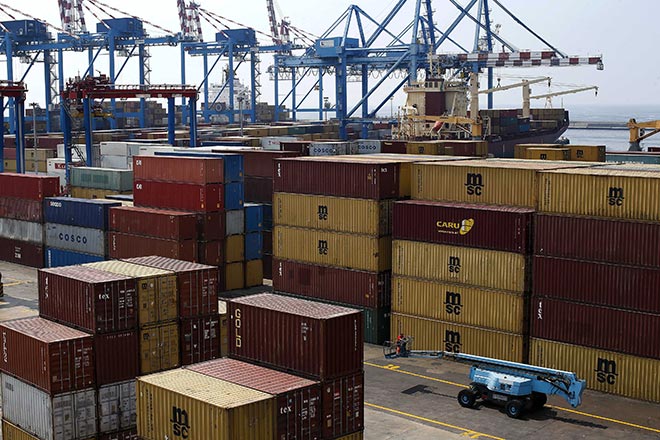
The ongoing slowdown in China’s demand for major Asean’s exports will not potentially derail the region’s economic growth as analysts believe, the impact will likely be manageable. — Reuters photo
KUCHING: The ongoing slowdown in China’s demand for major Asean’s exports will not potentially derail the region’s economic growth as analysts believe, the impact will likely be manageable.
RHB Research Sdn Bhd (RHB Research) in a recent report, said, the slowdown in China’s economic growth has been reflected in the ailing imports of primary industrial goods, namely; mineral fuels, lubricants and related materials, rubber, iron and steel products and more.
“The situation is compounded by lower commodity prices and a build-up of inventories of these products, forcing importers to cut deep into their imports.
“The glut is likely to pressure commodity prices and restrain demand for Asean-5’s (Indonesia, Malaysia, Philippines, Singapore, and Thailand) exports for the months to come.
“This has a negative implication on the Asean-5 economy as these products make up more than one-third of China’s imports from the region,” the research team said.
It also noted that Asean-5’s export growth to China has slackened from a high of 44.7 per cent in 2010 to negative 0.7 per cent in 2012, before staging a brief rebound in 2013 on the back of a stabilising economic growth in China.
However, in 2014, the Asean-5’s exports to China weakened and slipped into a contraction of 4.3 per cent before declining to minus 12.5 per cent year-on-year (y-o-y) in the first four months of 2015.
Nevertheless, RHB Research highlighted, although a slowdown in China’s economic growth will likely impact major Asean’s exports and the region’s economic growth due to the two region’s trade ties, the affect would likely be manageable.
“We believe the impact will likely be manageable, as exports to China only accounted for 10 to 13 per cent of these countries’ total exports.
“Although Indonesia’s exports are more vulnerable to a slowdown in China’s economic growth, it has a large domestic market to cushion it,” it opined.
It noted that the weakening of Asean-5’s exports to China was led by Indonesia, plunging by 22.1 per cent in 2014 and further by 23.8 per cent y-o-y in four months through April this year, mainly driven by the tepid price of mineral products.
“Based on our sensitivity analysis, Indonesia will likely be impacted more significantly by the economic slowdown in China, as one per cent lower in China’s gross domestic product (GDP) growth would drag its exports down by 13.1 per cent given that it is highly dependent on mineral product exports to the former.
“This is followed by Philippines and Thailand, which will suffer 4.2 and 1.7 per cent drops in exports, respectively.
“The impact on Malaysia and Singapore will be less severe with their exports falling by 0.3 and 0.6 per cent, respectively,” RHB Research explained.
Meanwhile, more on Malaysia’s exports to China, the research team pointed out that the export share had declined from 13.3 per cent in 2013 to 12 per cent in 2014, and further to 11.7 per cent in the first four months of 2015.
Overall, it noted that exports to China from Malaysia remained sluggish, in line with a slowdown in domestic demand in China.
Nevertheless, RHB Research viewed, “We opined that Malaysia would fare relatively better than Thailand, as its industrial primary products, which are in oversupply in China, account for smaller share in China’s imports from the country.”
Aside from that, the research team believed Malaysia’s GDP growth will improve to 5.2 per cent y-o-y in the second half of 2015, after slowing to an estimate 4.8 per cent in the first half.
However, it noted that there is a downside risk to its forecast should consumers and businesses take longer-than-expected time to adapt to the recently implemented goods and services tax (GST), made worse by ongoing political uncertainties.
